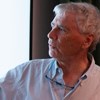broome4
John Broome
I am Emeritus White’s Professor of Moral Philosophy and Emeritus Fellow of Corpus Christi College at the University of Oxford. I am also a Visiting Professor at Stanford University, and Adjunct Profes
John Broome: A Climate Bank to Combat Climate Change
The usual way of thinking about climate change is that the present generation will have to make large sacrifices in order to reduce emissions. For example, by consuming less goods and services. This is one reason why cutting emissions is so hard. But what if there is a way to get climate change under control where no one needs to sacrifice?

A Climate Bank to Combat Climate Change: A conversation between John Broome & Gustaf Arrhenius
Reducing emissions and combatting climate change now will be of huge value for the coming generations. In principle this value could be used to fund the huge green investment loans needed today in ord
Studies on climate ethics and future generations vol. 3
Working paper series 2021:1-10 Joe Roussos & Paul Bowman (eds) This volume comprises the third collection of working papers by researchers within the program Climate ethics and future generations.Th
Studies on climate ethics and future generations vol. 5
Working papers 2023-1-11 Tim Campbell & Olle Torpman (eds.) 1. How to Feel About Climate Change? An Analysis of the Normativity of Climate Emotions Julia Mosquera & Kirsti Jylhä 2. How to Value a
A more plausible collapsing principle
Theoria, Volume 84, Issue 4. doi.org/10.1111/theo.12166 Abstract In 1997 John Broome presented the Collapsing Argument that was meant to establish that non‐conventional comparative relations (e.g., “par
Climate change: Life and death
John Broome, White's Professor of Moral Philosophy The international community has agreed on the aim of avoiding dangerous interference with the climate system. Determining what level of interference i
Being and Well-Being
in: Weighing and Reasoning. Themes from the Philosophy of John Broome, Eds.Iwao Hirose and Andrew Reisner, Oxford University Press. This chapter discusses the question of whether we can make it better

Daniel Hausman: What is a Fair Allocation of Healthcare?
Research seminar with Daniel M. Hausman, Research Professor at Center for Population-Level Bioethics at Rutgers University. This seminar is arranged by the Institute for Futures Studies and Center for
Axiological Retributivism and the Desert Neutrality Paradox
Campbell, T. Axiological Retributivism and the Desert Neutrality Paradox. Philosophies 2022, 7, 80. https://doi.org/10.3390/philosophies7040080 Abstract: According to axiological retributivism, people canan outcome in which someone gets what she deserves, even if it is bad for her, can thereby haveintrinsic positive value. A question seldom asked is how axiological retributivism should deal withcomparisons of outcomes that differ with respect to the number and identities of deserving agents.Attempting to answer this question exposes a problem for axiological retributivism that parallels awell-known problem in population axiology introduced by John Broome. The problem for axiologicalretributivism is that it supports the existence of a range of negative wellbeing levels such that if adeserving person comes into existence at any of these levels, the resulting outcome is neither betternor worse with respect to desert. However, the existence of such a range is inconsistent with a setof very plausible axiological claims. I call this the desert neutrality paradox. After introducing theparadox, I consider several possible responses to it. I suggest that one reasonable response, thoughperhaps not the only one, is to reject axiological retributivism.








